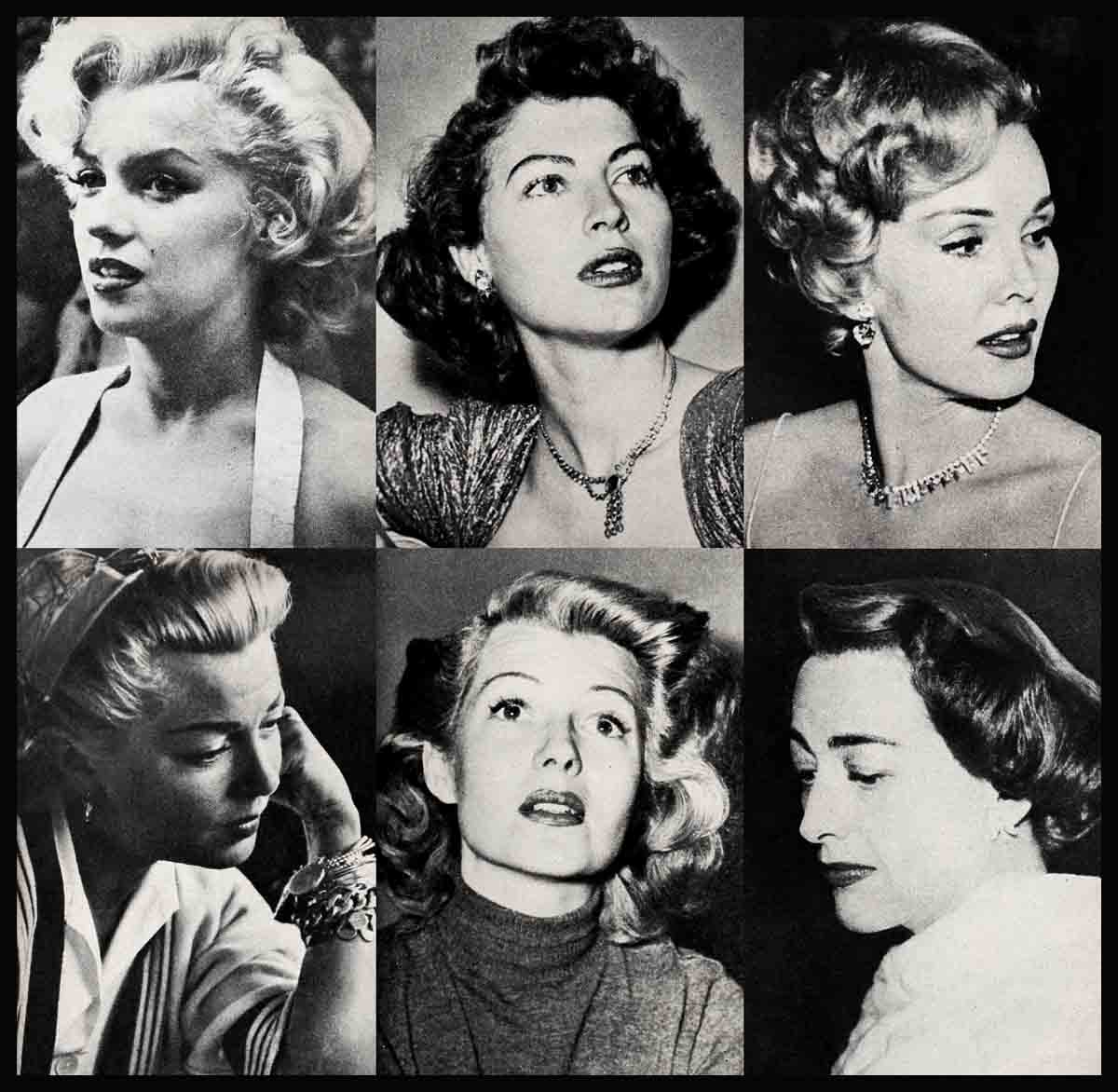
Hollywood’s Lost Ladies?
I’m just reading a little piece in which Mrs. James Mason says that Hollywood women are the most insecure, the most restless and dissatisfied in the world. And I’ve been thinking. Maybe this time pouting Pamela has said something! But up to now no one has had the courage to come right out with it. Yet it’s tragically true: If you lift the lid off the glamour, it’s amazing what you see under the surface of happy-go-lucky Hollywood.
Is Marilyn Monroe restless or dissatisfied? You bet she is—both! I never met a girl more insecure, more afraid of everything. Why, she practically fainted at a banquet when she was called to the platform to receive an award. The studio man with her had—literally—to pinch her in the side to get her up on her feet. Her swaying wriggle came perilously close to a stumble before she managed to stagger to the microphone. And I’ve never met a girl who was taken ill as much as Marilyn—from anemia to skin rashes. A lot of it is mental. She’s even been afraid to marry Joe DiMaggio because it might hurt her career. And it’s not as if she were saving a fortune. Her salary is low for a movie star, and Uncle Sam and her agents get most of it.
On the other hand,. take a look at one of the ladies feuding with Marilyn—namely, Joan Crawford. No one is more restless or dissatisfied than Joan, who has everything to make her calm—everything except a man of her own, unless that really is a romance with Milton Rackmil. She never stops to say, “Look what I’ve done”—always, “What haven’t I got?” Her house is the barometer of her insecurity. Her unceasing search for perfection in herself and her children is the clue for any psychiatrist to find the deep ineradicable streak of unrest; it reaches back into her past, clouds her present, and could destroy her future happiness.
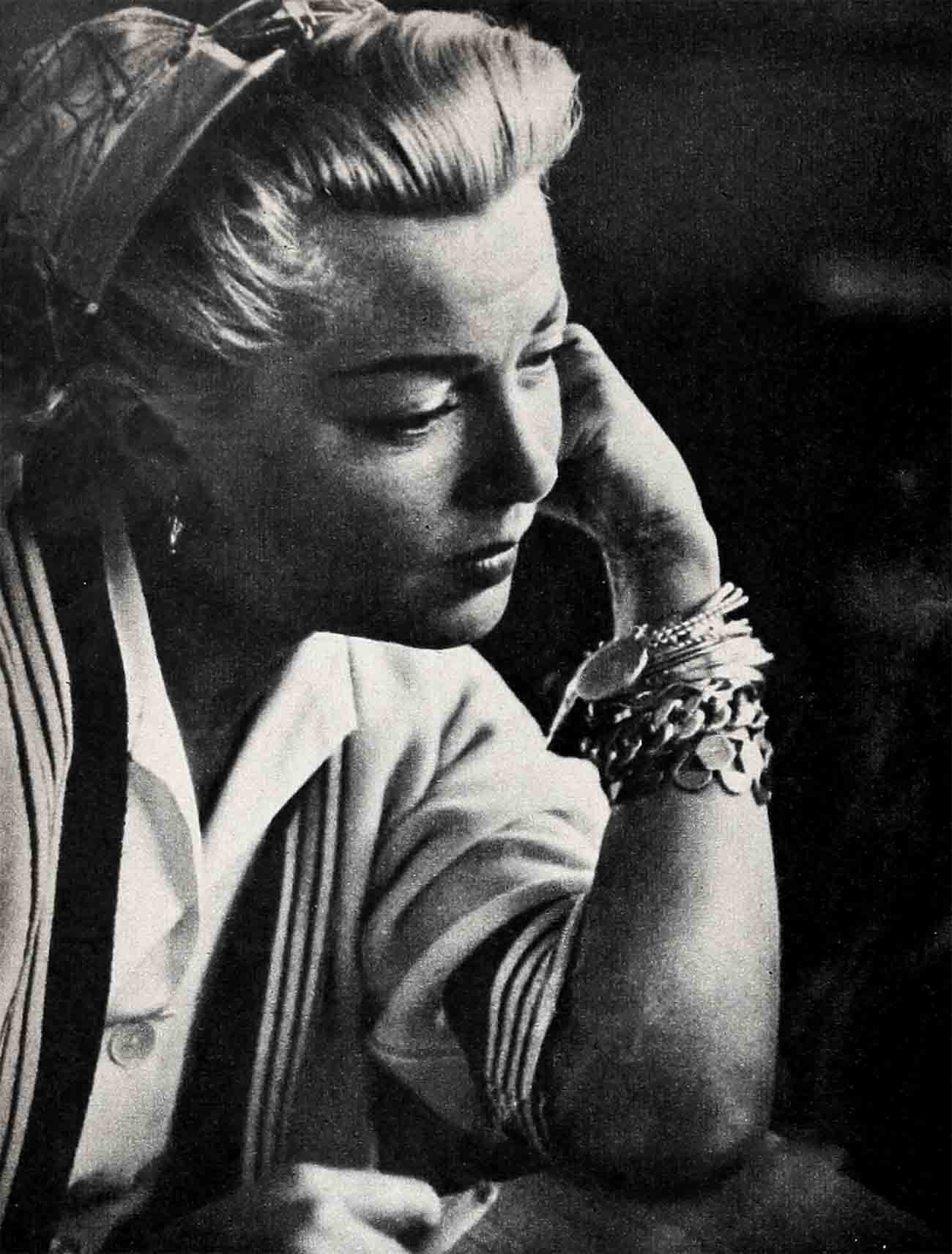
Take that house. It was Spanish when she bought it in 1929. She has redone it every year, with false ceilings, false floors, false walls over the stained windows; modern, early American, back to modern. Always changing, always trying something new. She can’t keep servants because it isn’t humanly possible to meet her demands. If she doesn’t work for a week, she’s worried. She needs constant reassurance of her importance in the Hollywood scheme of life. She writes thousands of letters a month. If you thank her on a postcard, Joan will thank you for thanking her. If only she would stop to take stock of her assets, some nice guy could catch up with her and give her the only thing that could ever make her happy—a little emotional security.
It took reports of a violent fight and the announcement of Susan Hayward’s separation and impending divorce from Jess Barker to make me realize what a good actress Susan is. Every time I had talked with her about Jess she raved about her happy marriage and how one day this town would realize what a great actor he was. But she was covering up for a very unsatisfactory way of life where she was the breadwinner, and he stayed home and looked after the kids. Directly his career started to go again, there was no further need for pretense. Susan was quite wonderful, though, during the years of their marriage. I remember when a top executive tried to invite her to see her latest picture with him in his private projection room and he pointedly did not include Jess. “Look, mister,” said the hot-tempered redhead, “I work for you from nine to six, but on my own time my husband comes with me, or I don’t go.” She didn’t go.
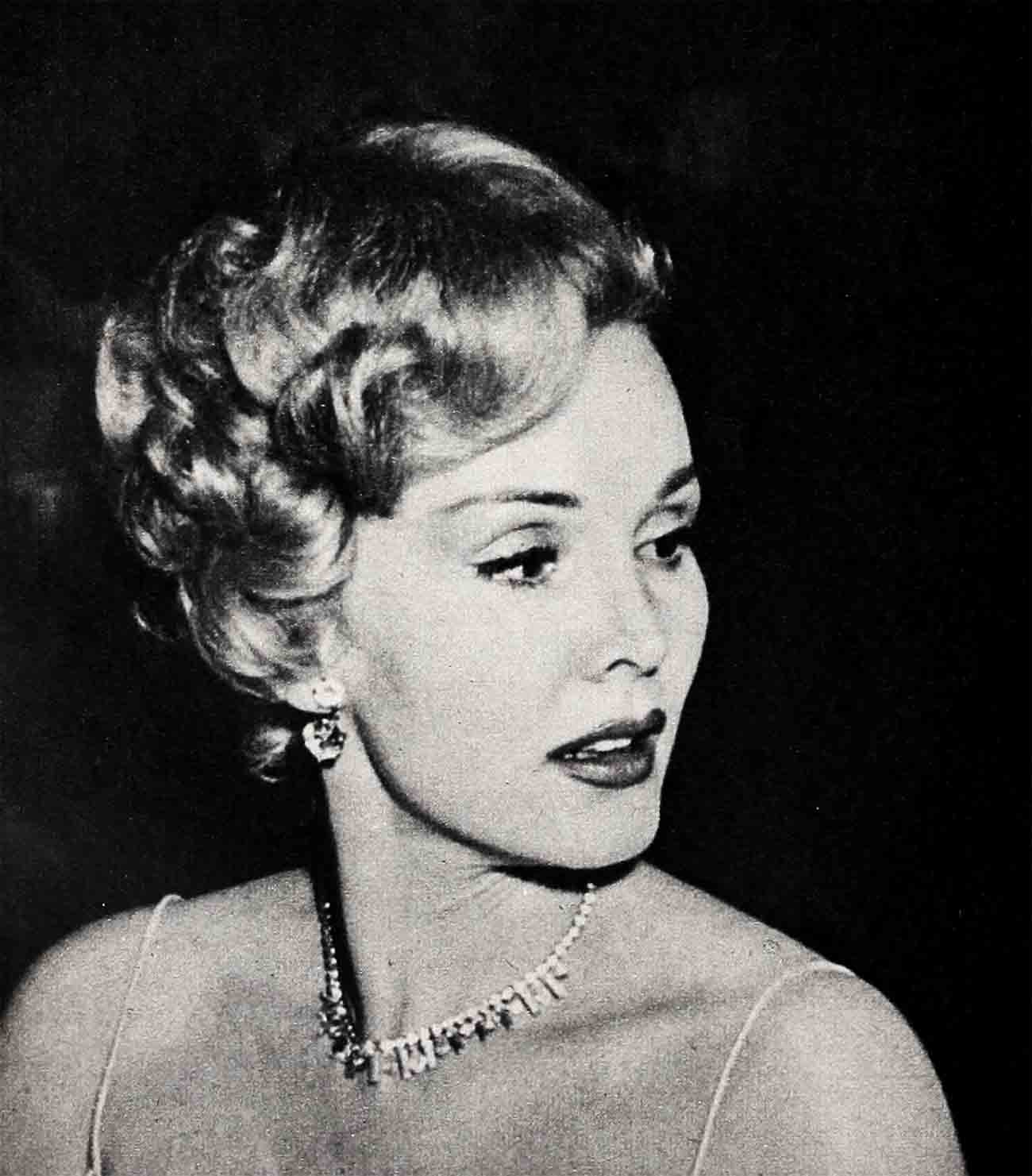
Of course the classic deception of all time was Janie Powell’s supposedly “ideal” marriage. It’s an old saying, but always true, that no one can break up a happy marriage. And that creeping paralysis known as boredom must have set in with Jane and Geary Steffen, before Gene Nelson danced his way into Janie’s heart.
In one of her moments of despondency, Lana Turner wrote a Hollywood columnist that Lex Barker was shooting his mouth off about getting married to her. When she came out of it, Lana wrote another letter saying she didn’t mean a word of it. Obviously not, because a couple of weeks later Lana took Lex for her fourth husband. This really is a Lost Lady.
Lana and Ava Gardner don’t look a bit alike, but they have a lot in common, apart from both having married Artie Shaw, and both being in love—at different times of course—with Frank Sinatra. They’re both searching for stability and happiness. But it depends on what they mean by happiness. It isn’t earning a big salary—Lana makes $5,000 a week and Ava doesn’t get much less. It doesn’t mean getting married. Ava’s had three and Lana four husbands.
Happiness isn’t fine clothes and fancy jewels. It seems to me that happiness is a self-hypnotism, plus great unselfish love for others. You have to convince yourself, “This I like. This makes me happy. These people I love.” You have to feel well; it helps too to have some money in the bank, and you have to like your work. But above all you must love and be loved. When Ava and Lana realize this, what Lana calls “the rat race” will be over.
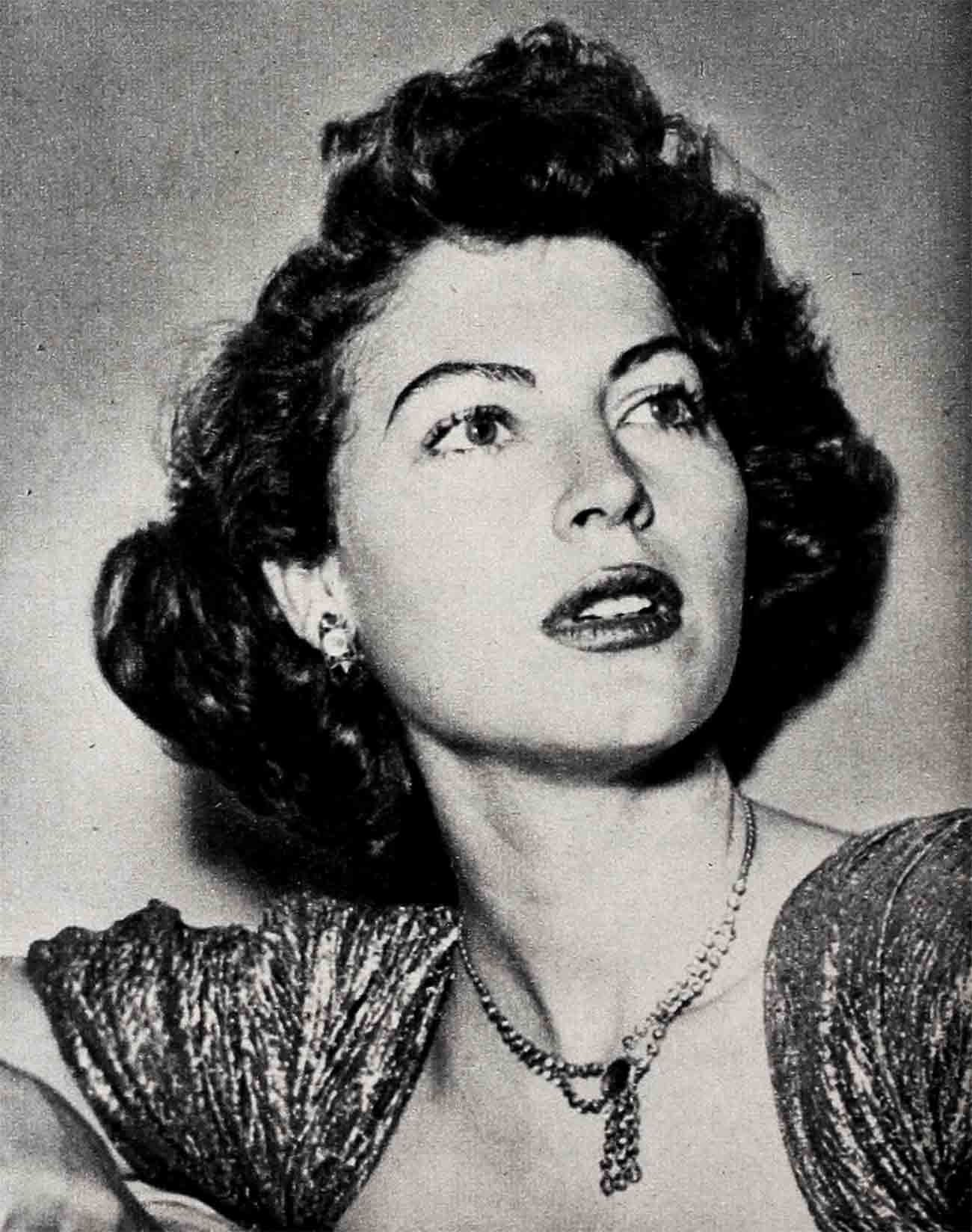
There was a sad rumor that Janet Leigh and Tony Curtis were on the verge of a dirge—just before she discovered she was pregnant. But I don’t believe that. Whenever I’ve seen them together they have always looked and talked like two people deeply in love. And I just can’t imagine any woman being frustrated and restless, living with Mr. Curtis. She might get irritated sometimes. But that’s all.
No one quite knows what made Eleanor Parker so bitter with Bert Friedlob, her husband of seven and a half years and the father of her three children. Eleanor won’t talk, and Bert isn’t telling. When I questioned him at the time of the separation, he said, “There isn’t a chance of our getting back together.” And that’s exactly what Eleanor said. How can you toss off seven and a half years of marriage?
Barbara Stanwyck is unhappy. But you have to hand it to Babs. She’s good-humored about her plight. There was only one time that Barbara lost her sense of humor—that was when Bob Taylor flirted with an Italian actress and Barbara divorced Bob, and she’s been sorry ever since. Of course if she hadn’t been so anxious to work all the time it might never have happened, because she’d have been there in Italy with him.
Barbara doesn’t breathe right unless she’s working. It’s her past catching up—an orphanage, ‘tho money, and her first marriage to Frank Fay leaving a scar that will never heal. But as long as she is working she has no time to fret and stew. Not so long ago when there were no picture offers for a year, she called her agent, and asked, “Am I through in pictures?” “No, it’s your price—$150,000 a picture,” he told her. “Then cut it to $100,000, or to $50,000. I want to work,” she replied. She said later she’d have signed for $5,000—just to work.
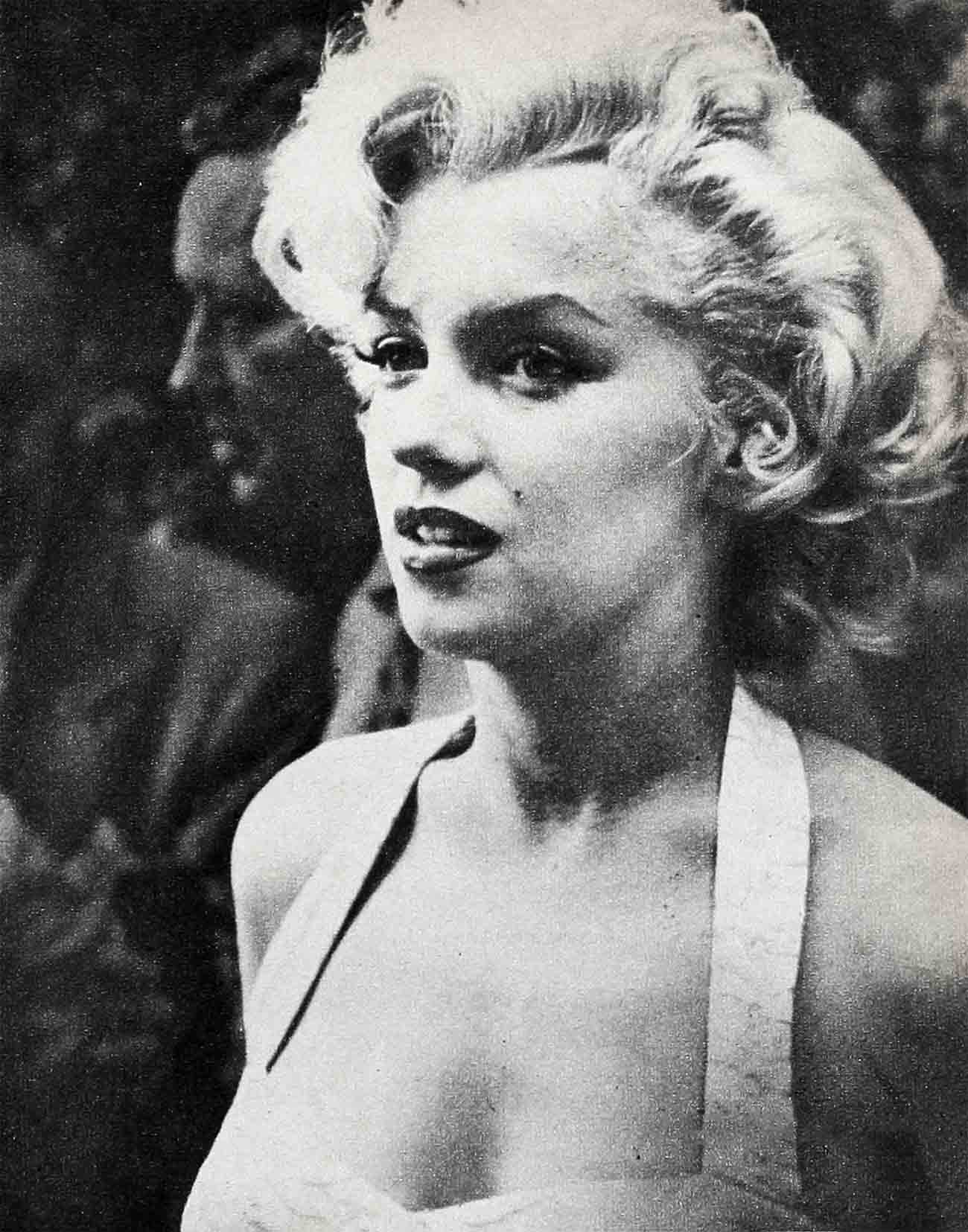
Greer Garson is another Hollywood actress who is unhappy unless working—even though she has a billionaire for a husband. A basic insecurity and a love of applause keep her hopping on the career front. Just to be a wife doesn’t seem to be enough. She has to be in the limelight.
And this was one reason why Vivien Leigh had that tragic breakdown. She had to keep going, even when she was ill. I had always thought she was trying to keep up with Sir Larry Olivier. And I still do. He never should have allowed her to play Blanche in “Streetcar Named Desire”—on the stage, I mean. She’s never been really well since the loss of their baby, which she had wanted so much. So much beauty and so much sweetness and talent. And so much tragedy.
Shelley Winters is more subdued and, oddly enough, happier than I’ve ever known her. She seems reconciled to whatever is in store for her marriage with Vittorio Gassman. Id say the first flush of ecstasy is over. She has the baby and the career, and that seems to be enough—for the time being anyway.
Zsa Zsa Gabor reminds me of the impotent man who is always talking of female conquests—he has to prove it to others because he can never convince himself. Zsa Zsa talks non-stop about the men who are madly in love with her. But she seems to have done the falling herself lately—with Porfirio Rubirosa and, yes, George Sanders whose casual treatment of her—and all women—seems to be his major attraction for her and them. Zsa Zsa tells me repeatedly that all she wants now is a career. She isn’t fooling me. She wants admiration, and more and more of the same.
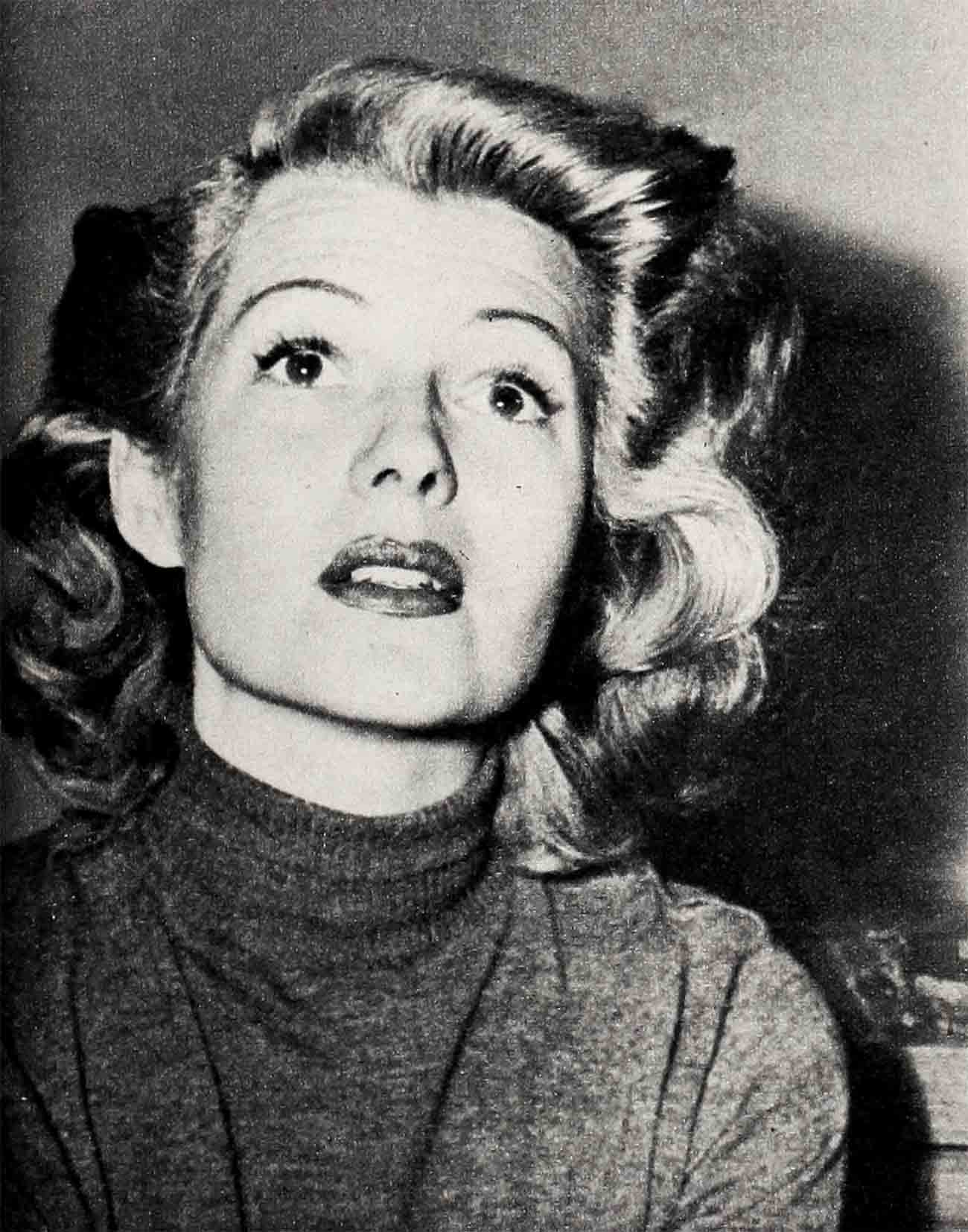
Rita Hayworth’s friends were worried when her reconciliation with Prince Aly Khan went kaput. “Where does she go from there?” they anxiously asked. To another love affair of course. But we didn’t expect it to be mild Dick Haymes. But just as long as someone is telling Rita she is lovely to look at and delightful to know, she’ll be in a pleasant state of excitement that can pass for happiness on a dark night. Rita isn’t restless. She’s too lazy for such active emotion. And we don’t really have to worry about her too much. I think she’ll marry again, have some more children, and when she has saved enough money, she’ll retire and sit by the fire in her bedroom slippers for the rest of her life.
You could say the same for Judy Garland now. She’s doing “A Star Is Born,” but I believe she’d rather do nothing—if Sid Luft weren’t there to prod.
I’ve never known Hedy Lamarr when she wasn’t beefing about something—her health or her husbands mostly. When she had a guy who could support her—Fritz Mandl—she ran away from him. With Gene Markey she wanted to stay home with the chickens, and he wanted to show her off in the cafes. She should have been happy with John Loder because he was ready, willing and able to do anything she wanted him to. But she’d complain to me that life was too tough when she had to be the breadwinner. Just to make her feel better she’d charge Loder for board and bed. But it was all on the house. So with Ted Stauffer she decided to give up her career and let him do the paying. We all know how that ended. Now she’s racing around in Europe, and her children are at school in San Francisco. But if you were to ask her what she is trying so desperately to find, I doubt whether she could tell you.
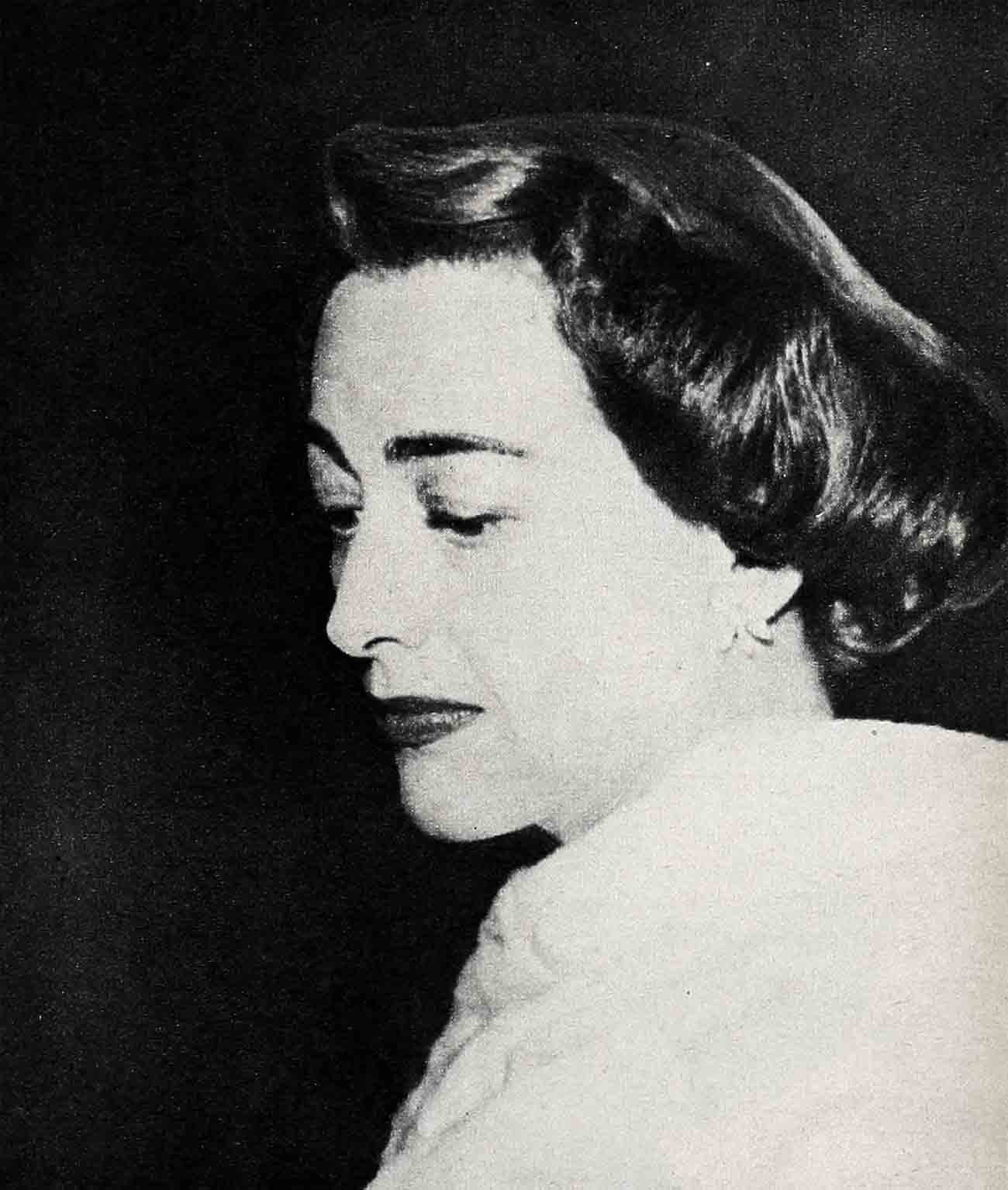
Never envy the wives of movie stars. Most of them have an awful time. They’re usually pretty, and it’s tough to take a back seat all the time while the fans clamor for their husbands. As Pamela Mason said in that interview, “As a class they live as well or better than women anywhere else. They have beautiful homes, money for clothes. They drive their own cars and they don’t have to look after their children. But still they’re miserable.”
Take Mrs. Gary Cooper. She has never wanted to divorce Gary because she loves her position as Mrs. Cooper. But it was awfully boring for her to stand aside while fans rushed for his autograph and girls of all ages swooned. And if the romance with Pat Neal hadn’t been so public, she might have suffered in more or less silence for the rest of her life.
And Mrs. Dick Haymes. And I do mean Nora Eddington Flynn Haymes. The love was over, but the humiliation lingered on, when Dick went to Hawaii and raced to New York to be with the new girl of his dreams, and I do mean Rita Hayworth. If you are married to someone who is not a movie star these embarrassing little incidents are private property.
And when the French climate proved too exciting for Mrs. Gregory Peck, she flew back to Hollywood with the excuse that the schools here were better for the children. Maybe they are. But that wasn’t why she returned.
But Alan Ladd’s wife Sue has no problems. I’d say she was the only non-working movie stars wife I know who really and truly enjoys her position. That’s because Alan doesn’t make a move without consulting her. And yet Susie is smart enough to let him be the master at home with the children and the servants. It’s wonderful to see their devotion.
Gene Kelly’s wife Betsy was quite content to be Mrs. Kelly for a long spell after they were married. Then came the old yearning for an identity of her own. And that was the time we started hearing rumors that all was not so lovey dovey.
I’m beginning to sound pretty gruesome—as though every female living in Hollywood is to be pitied. But we do have some well adjusted, un-frustrated femme stars. Doris Day is always happy. It’s part of her plan for living. She has everything to make her happy—a career in high gear, terrifically good health and lots of do-re-me in the bank. She didn’t spend much on frivolities before her marriage to Marty Melcher. And now she must be saving a goodly per cent of what they make. So she has security—financial and emotional—and it’s surprising how much these two factors contribute to down-to-earth happiness.
And if you say you know of a happier woman than Lucille Ball, I wouldn’t believe you. June Allyson has a wonderful time all the time. And Esther Williams fights like a tiger when anyone suggests her marriage with Ben Gage has the shakes. And no problems with Elizabeth Taylor, as of now. And there are more of course—Irene Dunne, Loretta Young, Jeanne Crain, Betsy Drake, Lauren Bacall—we could go on for quite a while. But my husband is waiting to take me to a movie, and I’d better jump to it. I don’t want him to get restless or dissatisfied!
THE END
It is a quote. PHOTOPLAY MAGAZINE NOVEMBER 1953




